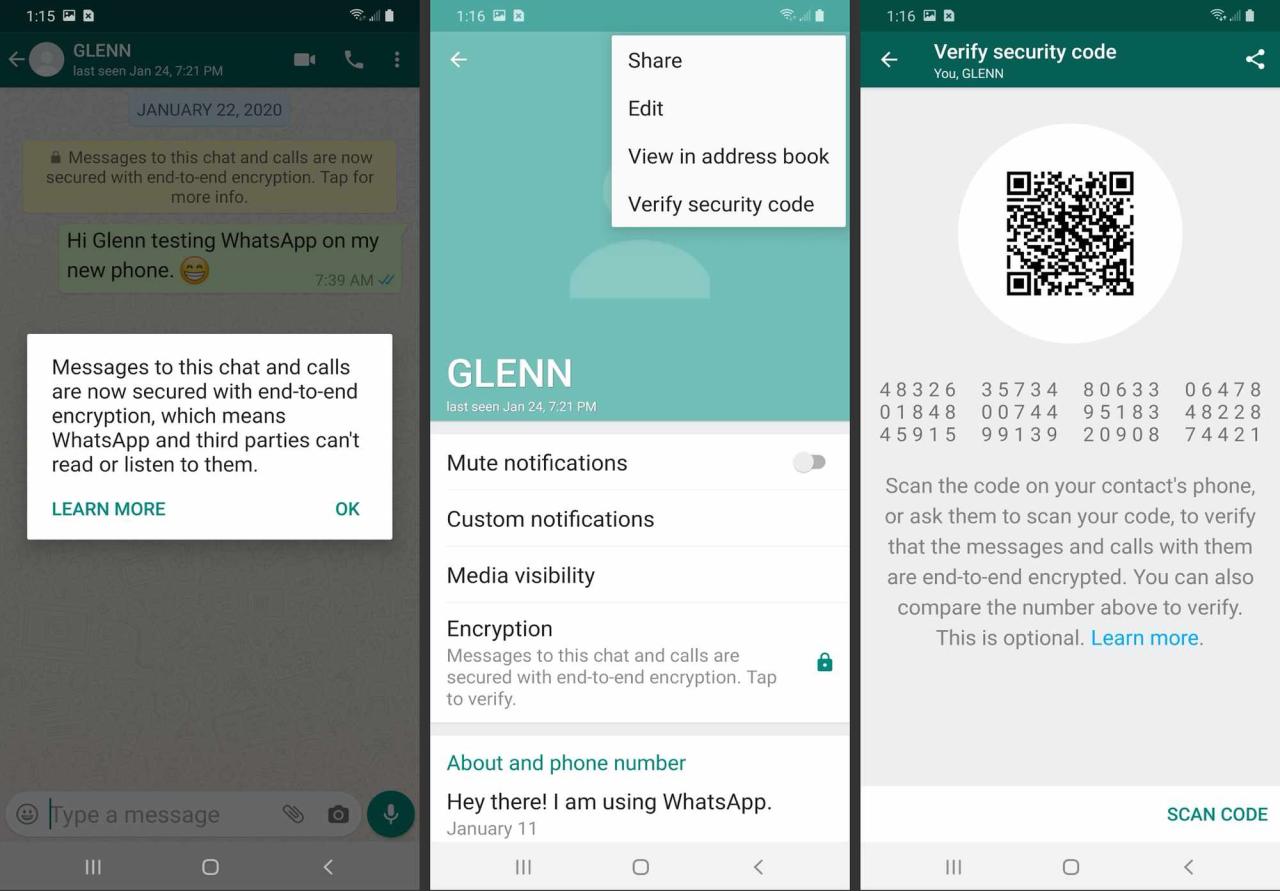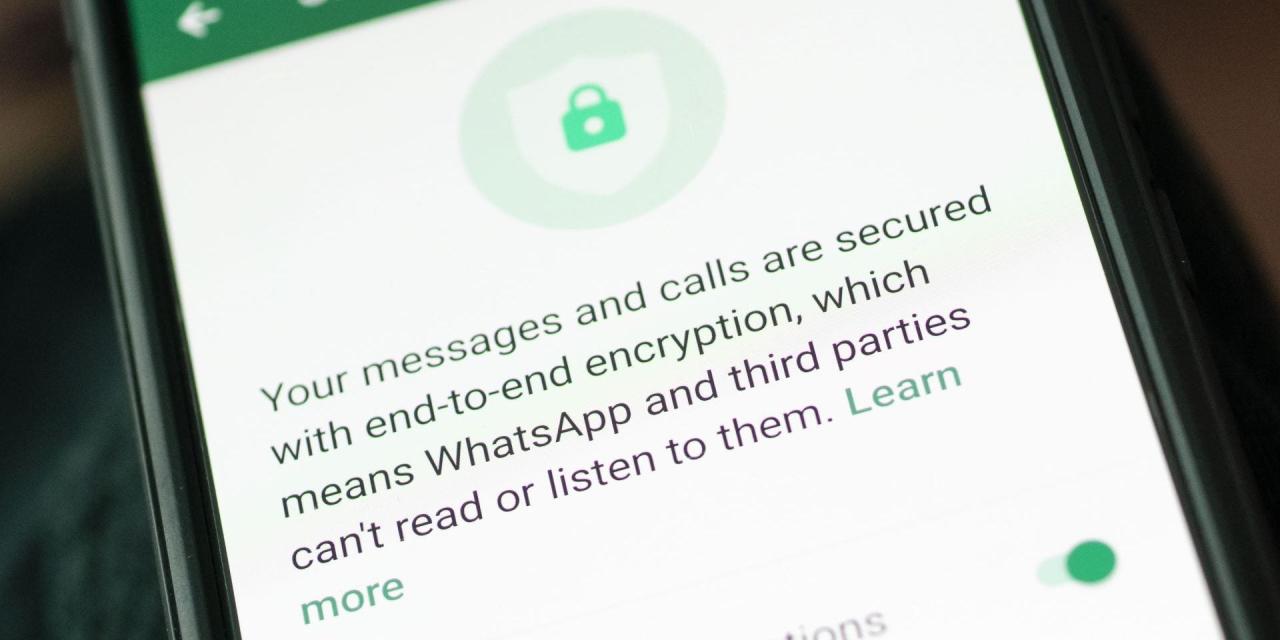In the realm of digital communication, WhatsApp stands as a beacon of privacy and security. Its end-to-end encryption technology has revolutionized the way we share sensitive information, offering an unparalleled level of protection against eavesdropping and data breaches. In this comprehensive guide, we delve into the intricate workings of WhatsApp’s encryption technology, exploring its technical details, security implications, and ethical considerations.
Join us as we unlock the secrets of this essential tool for secure communication.
From the intricacies of encryption algorithms to the role of encryption keys, we unravel the technical foundation of WhatsApp’s encryption technology. We examine the strengths and limitations of this robust system, addressing potential vulnerabilities and exploring how they can be mitigated.
By understanding the underlying mechanisms, we gain a deeper appreciation for the effectiveness and reliability of WhatsApp’s encryption.
Introduction
WhatsApp encryption technology is a security feature that protects user messages and calls from being intercepted by third parties. It uses end-to-end encryption, which means that only the sender and recipient of a message can read it. This is in contrast to traditional encryption methods, which use a third-party server to encrypt and decrypt messages.WhatsApp’s
end-to-end encryption is important for user privacy because it prevents unauthorized access to sensitive information. This includes messages, photos, videos, and voice calls. Without end-to-end encryption, these communications could be intercepted by hackers, government agencies, or other third parties.
Technical Details of WhatsApp Encryption
WhatsApp employs robust encryption protocols to safeguard the privacy of its users. The platform leverages the Signal Protocol, an open-source cryptographic framework designed specifically for secure messaging applications.
Encryption Algorithm
WhatsApp utilizes the Advanced Encryption Standard (AES), a symmetric-key encryption algorithm renowned for its reliability and efficiency. AES operates in cipher block chaining (CBC) mode, ensuring the integrity and confidentiality of transmitted messages.
Key Generation and Management
WhatsApp employs a Diffie-Hellman key exchange mechanism to establish a shared secret key between the sender and recipient. This key is used to encrypt and decrypt messages. Additionally, WhatsApp utilizes a ratchet mechanism to generate a new key for each message, enhancing the security of ongoing conversations.
Encryption and Decryption Process
When a message is sent, WhatsApp encrypts it using the shared secret key. The encrypted message is then transmitted to the recipient. Upon receipt, the recipient uses the same shared secret key to decrypt the message, ensuring that only the intended recipient can access its contents.
Security Implications of WhatsApp Encryption

WhatsApp’s end-to-end encryption has significantly enhanced the privacy and security of user communications. However, like any security measure, it has both strengths and limitations.
Strengths
- Confidentiality: Messages are encrypted from the sender’s device to the recipient’s device, ensuring that only the intended parties can read them.
- Authentication: The encryption protocol verifies the identity of the sender and recipient, preventing unauthorized access to messages.
- Forward Secrecy: Even if an attacker gains access to an encryption key, they cannot decrypt past messages.
Limitations
- Metadata Exposure: While message content is encrypted, metadata such as sender and recipient phone numbers, timestamps, and group membership is not.
- Device Security: Encryption is only effective if the sender and recipient devices are secure from malware or other vulnerabilities.
- Government Access: Governments may require access to encrypted messages for law enforcement or national security purposes.
Potential Vulnerabilities and Mitigation
Despite its strengths, WhatsApp encryption has faced some potential vulnerabilities, including:
- Side-channel Attacks: Attackers may exploit device vulnerabilities to infer information about encrypted messages.
- Man-in-the-Middle Attacks: An attacker may intercept messages and modify them before they reach the intended recipient.
WhatsApp has addressed these vulnerabilities through measures such as:
- Device Verification: Users can verify the identity of their contacts to prevent man-in-the-middle attacks.
- Signal Protocol: WhatsApp uses the Signal Protocol, which provides forward secrecy and protects against side-channel attacks.
Implications for Law Enforcement and National Security
WhatsApp’s encryption has raised concerns for law enforcement and national security agencies, as it limits their ability to access encrypted communications.
- Balancing Privacy and Security: Governments must strike a balance between protecting user privacy and ensuring public safety.
- Legal Backdoors: Some governments have proposed introducing legal backdoors into encryption protocols to allow law enforcement access to encrypted messages.
- Transparency and Accountability: Encryption companies must be transparent about their encryption protocols and accountable for any potential security breaches.
Privacy Concerns and Ethical Implications

WhatsApp encryption raises significant privacy concerns. End-to-end encryption prevents third parties, including WhatsApp, from accessing the content of messages. This enhances user privacy by protecting sensitive communications from unauthorized access. However, it also poses challenges for law enforcement and national security agencies seeking to intercept communications for investigations or counterterrorism efforts.
Balancing Privacy and Transparency
The encryption of WhatsApp messages raises ethical considerations regarding the balance between user privacy and the need for transparency and accountability. While encryption safeguards privacy, it can also hinder investigations into illegal activities or protect individuals from being held accountable for their actions.
Governments and law enforcement agencies argue that encryption hinders their ability to combat crime and terrorism, while privacy advocates emphasize the importance of protecting individual rights and freedoms.
Transparency and Accountability
The ethical implications of WhatsApp encryption extend to the need for transparency and accountability. Encrypted communications can make it difficult to hold individuals or organizations accountable for their actions, as law enforcement and other parties may be unable to access necessary evidence.
This raises concerns about the potential for abuse of encryption to facilitate illegal activities or evade responsibility.
Future Developments and Trends
The future of encryption technology holds exciting possibilities and advancements. WhatsApp, as a leading messaging platform, is likely to continue investing in strengthening its encryption capabilities to enhance user privacy and security. Emerging trends in encryption technology include the increased adoption of post-quantum cryptography, homomorphic encryption, and blockchain-based encryption.
These advancements promise to address evolving threats and ensure the continued protection of sensitive communication data.
Potential Advancements in WhatsApp’s Encryption Capabilities
WhatsApp’s commitment to privacy has been evident in its continuous efforts to enhance its encryption capabilities. Future developments may include the implementation of end-to-end encryption for group chats, providing the same level of protection for multi-party conversations. Additionally, WhatsApp could explore integrating new encryption protocols that offer improved resistance against brute-force attacks and quantum computing threats.
Impact of New Technologies on Encrypted Communication
The emergence of new technologies, such as artificial intelligence (AI) and machine learning (ML), is expected to influence the future of encrypted communication. AI-powered algorithms can assist in detecting and preventing security breaches, while ML techniques can enhance encryption algorithms by identifying patterns and adapting to evolving threats.
Blockchain technology, with its decentralized and immutable nature, could play a role in secure key management and data storage, further strengthening the privacy and integrity of encrypted communication.
Summary
As the digital landscape continues to evolve, so too will the technologies that safeguard our privacy. WhatsApp’s encryption technology has set a high standard for secure communication, and its future advancements promise even greater protection. By embracing these innovations, we can ensure that our digital conversations remain confidential, empowering us to communicate with confidence and trust in the digital age.
Common Queries
What is end-to-end encryption, and how does it work in WhatsApp?
End-to-end encryption ensures that messages can only be read by the sender and intended recipient, even if intercepted by a third party. In WhatsApp, messages are encrypted on the sender’s device using a unique key, and only the recipient’s device has the corresponding key to decrypt them.
Is WhatsApp encryption completely unbreakable?
While WhatsApp’s encryption technology is robust, it is not entirely unbreakable. Advanced hacking techniques and government surveillance programs may have the capability to bypass encryption measures in certain circumstances.
Can law enforcement access encrypted WhatsApp messages?
WhatsApp does not store unencrypted messages on its servers, making it challenging for law enforcement to access them directly. However, in some cases, law enforcement may request user data from WhatsApp, including metadata associated with messages.
What are the ethical implications of WhatsApp encryption?
WhatsApp encryption raises ethical considerations related to privacy, transparency, and accountability. While it protects user privacy, it may also hinder law enforcement efforts to investigate crimes or prevent harm.
How can I ensure the security of my WhatsApp messages?
To enhance the security of your WhatsApp messages, enable two-factor authentication, use a strong password, and be cautious about sharing sensitive information in group chats.



